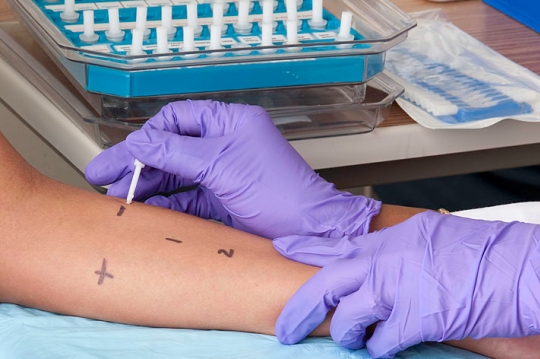
The prevalence of peanut allergies has grown significantly in recent years. In the U.S., for example, only 0.4% of children were reported to have a peanut allergy in 1997. By 2008, the percentage had more than tripled to 1.4%.1 As a result, people have become more aware of peanut allergies, and some businesses have made accomodations for people who have them. Delta airlines, for example, says:
When you notify us that you have a peanut allergy, we’ll refrain from serving peanuts and peanut products onboard your flight. We’ll also advise cabin service to board additional non-peanut snacks, which will allow our flight attendants to serve these snack items to everyone within this area. Gate agents will be notified in case you’d like to pre-board and cleanse the immediate seating area. Unfortunately we still can’t guarantee that the flight will be completely peanut-free. Note that some snack products on board may be processed in plants which also process peanut products.
This is important, since some cases of peanut allergies have resulted in tragic deaths (see here, here, and here, for example).
Naturally, many parents would like to know if there is anything they can do to prevent their children from developing peanut allergies. In the year 2000, the American Academy of Pediatrics said that the best thing to do was to avoid peanut products for any child who showed any risk of allergy. However, the Academy reversed itself in 2008, saying there was no evidence that peanut avoidance reduced the risk of a child developing a peanut allergy later in life.2
A study released earlier this year now tells us that the evidence points in exactly the opposite direction: If you want to prevent peanut allergies in your children, you should consider exposing them to small amounts of peanut products when they are very young.3
In the study, the researchers examined babies that were between 4 and 11 months old. The babies were deemed to be at risk for allergies because they had eczema or were already allergic to eggs. They gave a skin-prick test (pictured above with an adult) to the babies to determine whether or not they were currently allergic to peanuts. If they had a strong reaction to the test, they were excluded from the study. In the end, the researchers found 530 babies who had no reaction to the test and 98 others who had a moderate reaction. Now remember, these children were at risk of allergies already, but they weren’t strongly allergic to peanuts yet.
They separated the children into two groups. One group was to avoid peanut products entirely, while those in the other group were given small doses of peanut butter three times a week. This went on until the children were 5 years old. The results were dramatic. Consider, for example, the babies who had no reaction to the skin-prick test. By the time they were 5 years old, 13.7% of those who avoided peanut products had developed an allergy to peanuts, but only 1.9% of those who were given regular doses of peanut butter developed a peanut allergy. In other words, the children were 7 times more likely to develop a peanut allergy if they avoided peanut products!
What about the group of babies who already had a moderate reaction to the skin-prick test for a peanut allergy? The results are not quite as staggering, but they are still impressive. 35.3% of those who avoided peanut products developed a full-blown allergy to peanuts, while only 10.6 of those who got regular doses of peanut butter were allergic. In the end, that means even if a child is predisposed to develop a peanut allergy (as determined by a skin-prick test), the child is better than 3 times more likely to develop the full-blown allergy if he or she avoids peanut products!
In my mind, this study supports the hygiene hypothesis, which says that the increase in allergies we have seen over the past few decades is a result of children being raised in too clean of an environment. As human beings, we are designed to be exposed to dirty situations and foreign chemicals. If we clean up the environment too much, our immune system doesn’t get the “training” it needs to respond appropriately to these things. As a result, when we are finally exposed to them, our immune system overreacts, causing an allergy. The more I read the medical literature, the more sense this hypothesis makes.
Now, of course, parents should not decide to give their children peanut products based solely on the results of this study. However, if your child is prone to allergies, consult with your doctor and have him or her read this latest study. It might help.
REFERENCES
1. Sicherer SH, Muñoz-Furlong A, Godbold JH, and Sampson HA, “US prevalence of self-reported peanut, tree nut, and sesame allergy: 11-year follow-up,” Journal of Allergy and Clinical Immunology 125(6):1322-1326, 2010.
Return to Text
2. Nathan Seppa, “Peanut Exposure Prevents Allergy,” Science News March 21, 2015, p. 15
Return to Text
3. George Du Toit, Graham Roberts, Peter H. Sayre, Henry T. Bahnson, Suzana Radulovic, Alexandra F. Santos, Helen A. Brough, Deborah Phippard, Monica Basting, Mary Feeney, Victor Turcanu, Michelle L. Sever, Margarita Gomez Lorenzo, Marshall Plaut, and Gideon Lack, “Randomized Trial of Peanut Consumption in Infants at Risk for Peanut Allergy,” New England Journal of Medicine 372(9):803-13, 2015
Return to Text
